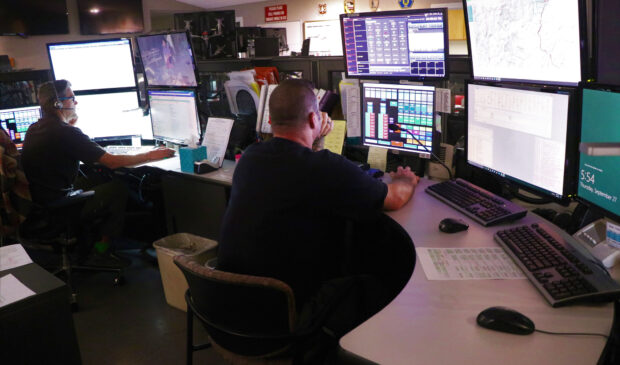Auditor’s report points out difficulties with 911 call taking
Tuesday, May 21, 2024 by
Jo Clifton As a result of complaints citizens made about problems they had connecting with the city’s 911 service during emergencies, City Council members Alison Alter and Vanessa Fuentes requested that the Office of the City Auditor look into how the Austin Police Department’s 911 service operates. Alter chairs the Audit and Finance Committee, and Fuentes is a member. A report on the results of their inquiry is on Wednesday’s committee agenda.
The Austin Monitor has been reporting on the need for more 911 call takers since at least 2011.
On Monday, APD told the Austin Monitor there are currently 19 vacancies out of 104 positions, a considerable improvement over previous years. In October, APD told the Monitor they had filled 72 out of 104 positions, leaving 32 vacancies.
According to that special report, which is not the same as an audit, APD “does not have a defined threshold for high 911 call volumes or different procedures to respond to high volumes.” The report states that like other cities, Austin’s 911 service will use overtime or reassign staff when demand is high.
Fuentes has said that lack of a definition for high call volume is one of the problems. However, APD has worked to increase the number of call takers, which means less stress for those employees.
Auditors compared Austin to Portland, Oregon; Denver, Colorado; and Fort Worth, Dallas, San Antonio and Houston. They found that Austin has the second-widest range in the average number of calls per call taker. Austin call takers’ call volume ranged from 175 to 408 calls. Similarly, Denver call takers answered between 162 and 445 per shift. Dallas reported a range of 135 to 300 calls per shift, and Houston reported a range of 131 to 209 such interactions.
Comparing Austin with other cities, auditors found that while other cities might have practices similar to APD’s, several have additional strategies for addressing high call volume.
Dallas, Denver and Portland all reported that their call takers use an abridged call-taking script when they are experiencing high call volume. In addition, Portland transfers what are considered nonemergency calls to a third party outside of the agency.
Auditors also reported that they had found some cities starting to use artificial intelligence to address high call volumes. Austin currently uses AI for nonemergency calls as part of its iReport system. Auditors said in 2023, Portland began to use AI to assist with nonemergency calls, and Denver is exploring the technology.
“Denver is in the process of contracting AI technology for use during high demand call events and hopes to have AI technology implemented by 2025,” auditors noted. That city “is looking at using AI to geotag an area with a known incident and create a voice message for any 911 callers within the vicinity to let them know police are aware of the issue.” Auditors noted that such a procedure has the potential to reduce the number of callers about the same incident.
Photo made available through a Creative Commons license.
The Austin Monitor’s work is made possible by donations from the community. Though our reporting covers donors from time to time, we are careful to keep business and editorial efforts separate while maintaining transparency. A complete list of donors is available here, and our code of ethics is explained here.
You're a community leader
And we’re honored you look to us for serious, in-depth news. You know a strong community needs local and dedicated watchdog reporting. We’re here for you and that won’t change. Now will you take the powerful next step and support our nonprofit news organization?






